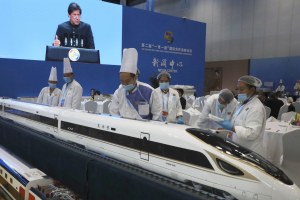The success of ambitious states will be determined by their ability to shape global infrastructures and the cities they connect around the world.
When President Biden announced the Build Back Better World initiative at the G7 meeting in Cornwall, UK, in 2021, it signaled a coming decade of infrastructure geopolitics. In many respects the move was a clear response to China’s Belt and Road Initiative (BRI)—which, since it was launched a decade ago in 2013, has put infrastructure at the heart of China’s own geopolitical grand strategy. In recent years, several trends have converged to produce this focus on the relationship between infrastructure, urban life, and international competition.
The first is the increasing fragility of the form of free market globalization that characterized the last four decades—and, indeed, gave us the world of interconnected global cities that we have come to take for granted. The second trend is the rise of China, and its ambitions to reshape the international environment in which it rises, bringing in its wake alternative values, models, and leadership ambitions, and, increasingly, the power to transmit them internationally. And the third is the increasingly alarming impact of climate change, and the pressing need for international leadership in the transition to more sustainable relationships with the natural world.
As major geopolitical powers such as the United States, the European Union, and China seek to come to terms with these trends, we appear to be leaving behind the last four decades of US-led globalization and entering into a new period with very different characteristics. This will be a period of infrastructural geopolitics, in which the leadership and vision of great powers, each with differing political, economic, and societal models, will determine how the 21st century will take shape, which states, and their allies will thrive, and which will falter.


